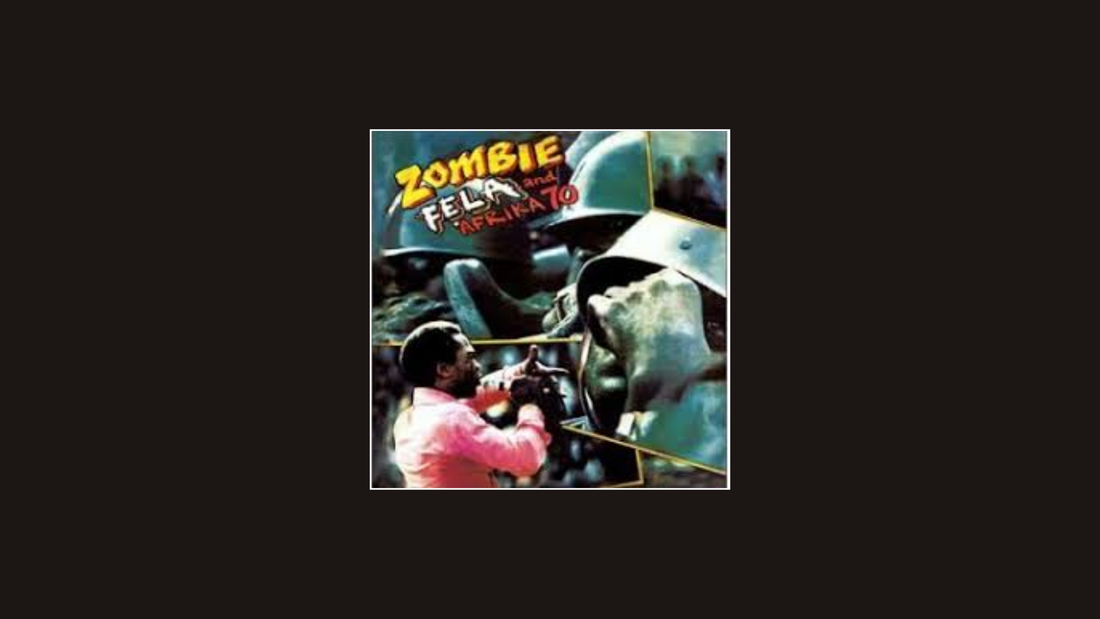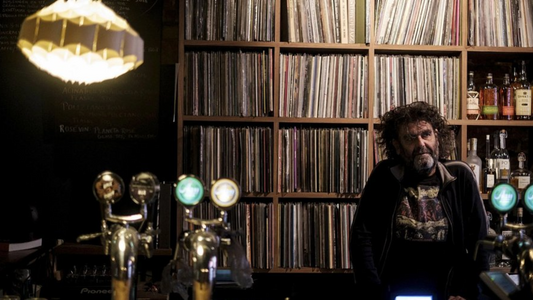
Fela Kuti – Zombie (1977)
By Rafi Mercer
The night does not always begin softly. Sometimes it starts with a charge, a pulse, a challenge. Drop the needle on Zombie and the room changes instantly. Horns cut like sirens, drums pound with military precision, and the chant rises not as entertainment but as provocation. This is Fela Kuti at his fiercest, a record that carries the weight of Lagos in the 1970s, a moment where music was not background but frontline. Released in 1977, Zombie is not just Afrobeat at its sharpest; it is one of the boldest collisions of rhythm and resistance ever pressed to vinyl.
The opening track, the title piece, is a seventeen-minute movement that stretches the very definition of a song. Tony Allen’s drumming anchors everything, a polyrhythmic lattice that never wavers, never relents. Against it, the horn section — piercing, unison, unbending — becomes both weapon and beacon. Fela’s electric keyboards and organ stabs punch holes in the rhythm, while the guitars coil around each other in endless circular riffs. And then comes the vocal: the mocking chant of “Zombie” aimed squarely at the Nigerian military. Soldiers, Fela suggests, are reduced to zombies, mindlessly obeying orders without thought or question. It was satire as dance music, political critique as hypnotic groove.
Hearing this track on a well-tuned system is to feel the architecture of sound itself. The low end is relentless, a wave that pushes through the chest and into the spine. Horns come from the corners of the room, stabbing air like knives. The call-and-response vocals fold the listener into the crowd, a reminder that this was music made not for isolation but for gathering. In a listening bar the track would feel almost dangerous, its energy impossible to contain in seated stillness. You can picture glasses shaking gently on tables, the floor vibrating beneath feet. Some music is polite; this is not. It demands that the night move.
The B-side continues the momentum. “Mister Follow Follow” is a different mode of critique, softer in tone but equally barbed. The groove here is more open, guitar lines carrying a touch more playfulness, yet the lyric warns against blind obedience. Again, Allen’s drumming is the constant — the invention of Afrobeat’s heartbeat. Every snare, every hi-hat, every kick is placed with microscopic attention, creating a net in which all other instruments can stretch and relax without collapse. For systems that reward detail, this is a drummer’s record as much as a bandleader’s.
What makes Zombie endure is not just its political bite but its sonic discipline. Fela’s Africa 70 band had, by this point, perfected their craft. Each part interlocks with the precision of a machine but the feel of a living, breathing organism. The bass does not solo, the guitars do not grandstand, the horns do not meander. Instead, every player becomes a cog in a rhythm engine that can run endlessly. When played loud, at scale, the sound becomes less about the individual instruments and more about the sensation of being carried — a tide of groove that sweeps you along whether you resist or not.
There is a paradox here that fascinates me. The music feels joyous, irresistible, danceable. Yet the subject matter is brutal, a satire on a violent, authoritarian military regime. Fela himself paid dearly for such outspokenness. After the release of Zombie, his commune, the Kalakuta Republic, was attacked by soldiers. His mother was thrown from a window and later died from her injuries. Houses were burned, people beaten. That this record survived, that it still plays today with such urgency, is testament to both the courage and the clarity of its vision. Few records sound so alive while carrying so much pain.
For listening culture, Zombie presents an interesting challenge. It is not background music, nor is it easy. It is groove as confrontation, rhythm as resistance. To put it on in a bar is to make a statement: that music is not merely about taste, but about truth. It asks listeners to reckon with history while moving their bodies, to recognise that joy and anger can occupy the same groove. In the context of a carefully tuned sound system, this becomes more than listening. It becomes witnessing.
From an audiophile perspective, the record is a marvel of analogue production. The density of the rhythm section, the brightness of the horns, the raw immediacy of the vocals — all of it benefits from the warmth and physicality of vinyl. Digital remasters can sometimes flatten this energy, make it too polite. On vinyl, especially original Nigerian pressings, the air itself seems to vibrate differently. The imperfections — a faint hiss, a crackle at the edge of a groove — only intensify the sense of being present in that moment, in that Lagos studio, in that year of turmoil.
Play this record at the right point in the evening and it will reset the atmosphere. Too early, and it overwhelms. Too late, and it risks exhausting. But as the night tilts from conversation into movement, as drinks begin to loosen, as the lights dim to their second setting, this is the record that pushes the evening forward. Its repetition becomes trance, its satire becomes energy, its groove becomes undeniable. It is the sound of a night finding its stride, not in escape from reality but in collision with it.
For home listening, Zombie is both a challenge and a reward. It tests the patience of those unaccustomed to seventeen-minute tracks. But for those who surrender, it offers a depth that shorter, more polished songs cannot reach. The groove becomes a landscape, one you can walk through and discover new details each time: a horn flourish, a bass ghost note, a subtle change in Allen’s hi-hat pattern. This is music as architecture — a building you enter, explore, and leave changed.
Why does it belong in the Tracks & Tales library? Because it embodies what deep listening can mean. It proves that sound is not neutral, that it carries weight, history, politics, resistance. It reminds us that bars, rooms, and systems are not just places for pleasure but for presence. And it shows that rhythm, when pursued with conviction, can be as radical as any manifesto. In Fela’s hands, Afrobeat became not a genre but a movement. And Zombie remains its sharpest blade.
Drop the stylus, let the horns call, let the drums march. Feel the night stand to attention, not in obedience but in defiance. Fela Kuti will take it from there.
Rafi Mercer writes about the spaces where music matters. For more stories from Tracks & Tales, subscribe, or click here to read more.







